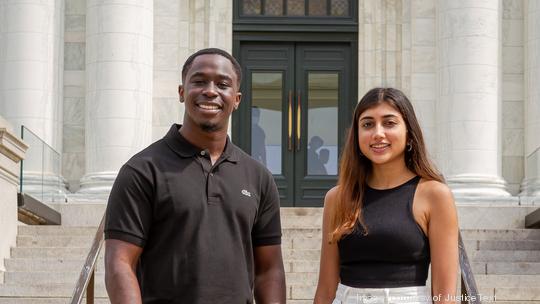
While students at the University of Chicago, Devshi Mehrotra and Leslie Jones-Dove wanted to use their software engineering skills to have a positive effect on their campus community. They were both involved in student clubs, advocating for criminal justice reform and racial equity.
During a project for their Entrepreneurship in Technology class, a combination of events catalyzed them to reach outside the bounds of the campus to local public defender offices.
What their needs assessment with those defenders revealed, ultimately evolved into JusticeText. It's a software platform that uses artificial intelligence to take the voluminous amount of video involved in many criminal cases and streamline it, expediting the video viewing process and giving defenders more time to build compelling cases with excerpts from the videos.
The startup recently closed a $2.2 million seed round, with participation from Bloomberg Beta and True Ventures, as well as Reid Hoffman, a LinkedIn cofounder, and musician John Legend.
Catalysts
Two catalysts motivated the co-founders on their path to creating JusticeText. One was when the dashboard camera footage of the murder of LaQuan McDonald was released.
“It helped us realize how video evidence can be leveraged to reveal the truth of how an event took place, and serve as a powerful witness,” Mehrotra said.
Another was when she read The New Jim Crow by Michelle Alexander.
“(The author) discussed how almost all technological advancements within the criminal justice system were those that made it easier to prosecute and incarcerate, and little resources were given to the defense side,” Mehrotra explained. “It inspired me to want to even the playing field.”
Foundation
JusticeText got its name because it enables tons of video footage to be transcribed, with the goal of making the entire justice system more efficient.
The co-founders piloted their technology with the Cook County Public Defender's Office in 2019. And then formally launched the company that same year in Chicago.
The video footage JusticeText typically deals with come from a variety of sources including body camera and dashcam videos, jail calls and interrogation videos.
Once the videos are uploaded to the platform, specific excerpts can be extracted, arming public defenders with the most compelling evidence to use during trials.
While it's estimated that more than 80% of criminal cases involve video evidence, there’s not always time available to sift through it all, as public defender offices are experiencing “extreme” staffing shortages, Mehrotra said. She pointed to the situation in Wisconsin, where turnover at state public defenders’ offices has increased in recent years, according to news reports. There are also staffing shortages that are affecting Wisconsin's entire legal system, according to those reports. The cause is attributed to higher workloads and more difficult work, as advanced technology — like the sophisticated use of scientific evidence — becomes more readily available.
Oregon is facing a similar challenge, as the American Bar Association found the state has just one-third the amount of necessary public defenders, due to heavy caseloads and low pay.
“On top of an already understaffed situation, advancements like body camera mandates and Ring doorbells, which are encouraging for the prospect of police accountability and evidence gathering, also mean that the workload per case has exponentially increased, as defenders are tasked with analyzing all this digital evidence by hand,” Mehrotra said.
This problem has “staggering” implications for the nation's entire justice system, she added.
“You often hear the phrase, ‘Justice delayed is justice denied,’ and that is exactly what is happening to these defendants,” she said.
How JusticeText Works
Public defenders can upload video files to the startup's platform and receive accurate transcriptions of each video.
The software uses AI algorithms to transcribe the videos. It can also automatically identify when different individuals are speaking.
The company currently works with more than 50 public defender offices nationwide. It plans to double that number over the next year.
Funding
The co-founders raised an initial $300,000 in pre-seed funding from 500 Startups and Stand Together Ventures Lab. Over the past few years, they received another $230,000 in investment and grants from the University of Chicago, Camelback Ventures, Google and MIT Solve.
In total, JusticeText has received $2.7 million.
Mentors include David Axelrod, a political consultant who served as the chief strategist for President Barack Obama. He provided the fledgling startup a small grant while the founders were still students.
While JusticeText is based in L.A., Mehrotra is originally from OC.
Already Making a Difference
One of the first offices to adopt JusticeText was the Tulsa-based legal-aid nonprofit, Still She Rises. Its defense team used JusticeText in its effort to get a second-degree murder charge against an indigent mother dismissed.
The evidence involved more than 20 hours of body-cam footage from all the officers on scene, in addition to dozens of hours of police interrogations and jail calls.
The defense team proved successful in getting the dismissal.



